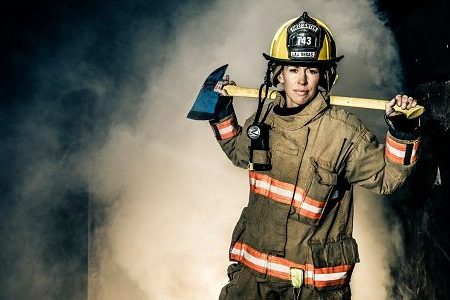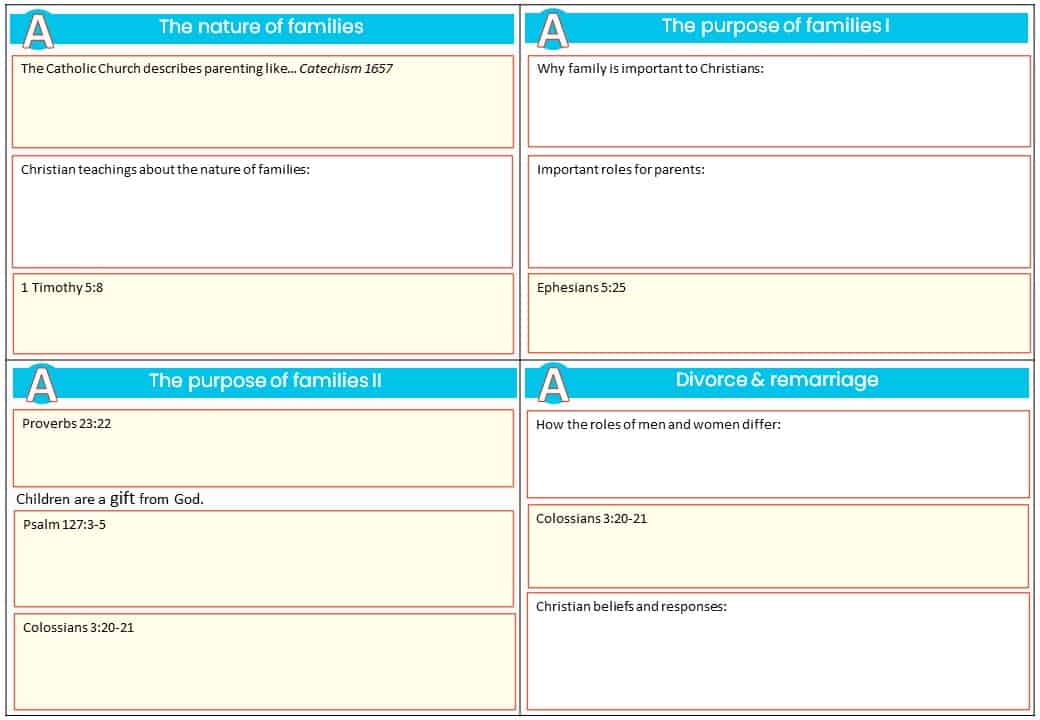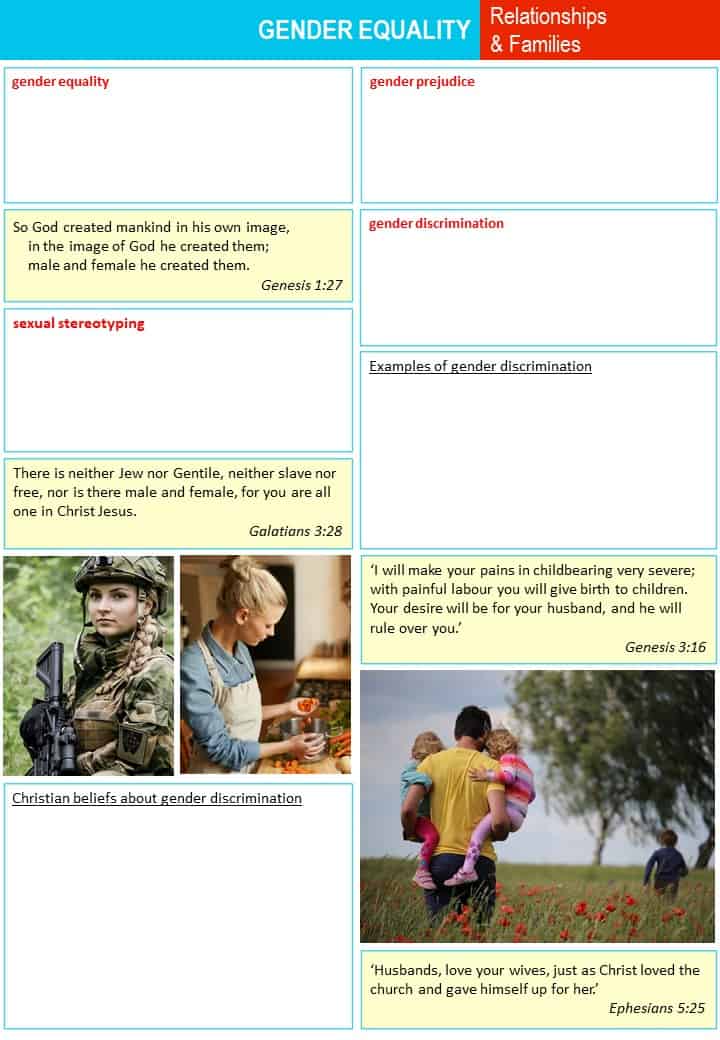Theme A
Relationships and families
Gender equality
- The roles of men and women.
- Gender equality.
- Gender prejudice and discrimination.
Gender equality
Give two religious teachings about gender discrimination. (2)
2019
- Historical interpretations of religious teachings have led to men taking the lead in many aspects of religion, for example leading worship
- traditionally many religious believers would argue that male leadership is scriptural, so argue that it is not discriminatory, however many religious believers may now challenge the interpretation of particular scriptures
- traditional views of roles within the family may be used, for example ‘Men work, women stay at home’ as examples of gender discrimination men and women have different but complementary roles, they are viewed as equal but different.
- gender discrimination is being challenged as for example more women become ministers and bishops in some sections of Christianity and rabbis in sections of Judaism
- men and women are created in the image of God, so discrimination is wrong ‘There is neither Jew nor Greek, male nor female, slave nor free for all are one in Christ Jesus.’ (Galatians 3:28)
Explain two contrasting religious beliefs about the roles of men and women. (4)
2019
- Most religions teach that male and female are of equal value may have different roles and responsibilities in family and society.
- Accept historical interpretations have given superiority to men eg. leading worship.
Christianity
- Some traditional Christians believe that men are the head of the family and women should mainly stay at home and care for the children. ‘Wives submit to your husbands as to the Lord, for the husband is head of the wife.’ (Ephesians 5:22)
- Some traditional Christians believe that this difference in roles is not gender inequality but that men and women have different but complementary roles.
- Many Christians today see marriage as an equal partnership where the different gifts of the couple strengthen family life.
- Within the Church of England the first women bishops were appointed in 2015 however within the Roman Catholic church only men may be ordained. Many non-conformist traditions, such as Methodists, have had women ministers for many years.
- Genesis 1:27 teaches that all humans were created in the image of God so all humans should be treated equally.
- Galatians 3:27 emphasises this, ‘There is neither Jew nor Greek, slave nor free, male nor female for you are all one in Christ Jesus.’
- Jesus treated women with respect and welcomed them as disciples, examples of Mary and Martha.
- Some of the earliest converts to Christianity were women and many became leaders for example, Dorcas in Joppa, Priscilla in Ephesus and Phoebe in Cenchraea, etc.
Explain two religious beliefs about the roles of men and women. (5)
2021
- Most religions teach that male and female are of equal value
- may have different roles and responsibilities in family and society
- historical interpretations have given superior roles to men, eg leading worship.
Christianity
- Jesus treated women with respect and welcomed them as disciples
- in Luke 10 the example of Mary and Martha showed that they were capable of more than just domestic tasks
- some of the earliest converts to Christianity were women / many became leaders for example Dorcas in Joppa /
Priscilla in Ephesus - Genesis 1:27 teaches that all humans were created in the image of God so all
humans should be treated equally - Galatians 3:27 emphasises this, ‘There is neither Jew nor Greek, slave nor free, male nor female for you are all one in Christ Jesus.’
- some traditional Christians take Genesis 3:16 literally, ‘your husband…will rule over you’ and argue that men are the head of the family
- women should mainly stay at home and care for the children ‘Wives submit to
your husbands as to the Lord, for the husband is head of the wife.’ (Ephesians 5:22) / - some traditional Christians believe that this difference in roles is not gender inequality but that men and women have different but complementary roles / many Christians today see marriage as an equal partnership where the different gifts of the couple strengthen family life / 1 Timothy 2:12, ‘I do not
permit a woman to teach or have authority over a man’ - based on this some traditional denominations only have male ministers / within the Church of England the first women bishops were appointed in 2015
- within the Roman Catholic church only men may be ordained
- many nonconformist traditions such as Methodists have had women ministers for many years, etc.
Judaism
- Everyone created by God / and in God’s image / so everyone is equal in God’s sight / ‘So God created human beings, making them to be like himself. He created them male and female.’ (Genesis 1:27)
- Tenakh tells stories of important women who are greatly respected for example, Deborah, Abigail, Ruth
- Orthodox Judaism sees the roles of men and women as separate but equal
- men are expected to work to support the family
- women are to care for the children and home / mother’s role is crucial in Judaism / and Judaism passes down the maternal line/ it is the important duty of women to ensure that the Jewish food laws are kept / the honour of welcoming in the Shabbat is also part of the role of the woman / she lights the candles / welcomes in Shabbat and says prayers / at the synagogue women do not play a part in the service / and sit separately from the men
- in Reformed and Liberal Judaism women are able to be rabbis / sit with men in the synagogue / and handle the Torah Scrolls, etc.
‘Men and women should not have equal rights.’ (12)
Spec 2
Arguments in support
• women do not have equal rights in practice even if they have them
in law/women’s pay is below that of men’s pay for similar jobs/many
areas of employment are still considered inappropriate for
women/top levels of management have fewer women than men/government/financial services run mainly by men, etc
• some traditional religious believers think women’s place is in the
home looking after children/looking after the household/educating
children in the faith/these expectations may restrict choices for
women who have family responsibilities/some religions restrict the
rights of women to initiate divorce, etc
• women face discrimination in the workplace/unfair interviews/sexual
harassment by colleagues/lack of promotion/sexual stereotyping,
etc.
Arguments in support of other views
• religions teach that men and women are equal before
God/salvation/enlightenment/spiritual reward open to women and
men, etc
• legislation has given women equal rights/eg Sex Discrimination Act
1975/Equal Pay Act 1970/Equality Act 2010/regarding equal pay
and conditions of employment for men and women doing the same
types of work, etc
• just because some religions assign a different role to women within
the family does not mean women do not have equal rights/equal
does not mean the same/religions respect the important role
women have in raising children in the faith/many religions today
consider marriage a partnership in which both men and women
take equal share in family responsibilities, etc.
Christianity
All people have been created as equals in the image of God/love one’s
neighbour means that discrimination is wrong/Jesus treated women
with respect/welcomed them as disciples/showed in the story of Mary
and Martha (Luke 10:38–42) that they were capable of things other
than domestic tasks/Paul taught there is neither male nor female, all
are one in Christ (Galatians 3:28)/but some traditional Christians see
men as head of the family/women’s role is to care for home and
children/some take Genesis 3:16 literally, ie your husband will rule over
you/most now see marriage as an equal partnership to which both men
and women contribute, etc.
Judaism
Everyone is created in the image of God and therefore equal in God’s
sight (Genesis 1:27)/the Tenakh records women prophets such as
Miriam, Deborah, Sarah, Hannah, Abigail, Huldah and Esther/women
traditionally had property rights/right to make own contracts/but roles of
men and women in the family are different/separate but equal/women
can have careers if it does not interfere with family responsibilities/only
men can initiate divorce/refuse to allow wife to have a get, etc.
‘Gender discrimination is always wrong.’ (12)
2020
Arguments in support
- Humans created by God.
- All are equal before God.
- Prejudiced attitudes cause people to act in unloving way and potentially discriminatory ways.
- Discrimination causes hurt and upset and so not a loving thing to do.
- Discrimination causes injustice.
- Discrimination prevents a person fulfilling their potential and stops them becoming the person God wants them to be, etc.
Arguments in support of other views
- Some religious believers see gender differences as the result of different roles rather than discrimination.
- Much religious teaching supports differences in roles and it cannot be explained away just because it is old and inconvenient.
- Men and women’s roles are complementary.
- What appears to be discrimination in a religion may be cultural expectation rather than religious belief.
- Some may support positive discrimination in promoting equality for example within the workplace, allowing women priests etc.
Christianity
- Christianity very clear that discrimination is wrong
- all are made in God’s image
- all equal before God ‘There is no Jew nor Gentile, slave nor freeman, male nor female, all are one in Christ Jesus’ (Galatians 3:28)
- ’Love your neighbour as you love yourself’
- ‘Do unto others what you would have done to you’ (Matthew 7:12)
- In the early church there is evidence of women having leading roles eg Dorcas in Joppa
- teaching that appears to be prejudiced to women may not be so on closer inspection / Paul’s instruction on the role of women in some of his letters appear to have been for that time in allowing the church to be a distinct witness against the practices that were going on at the time / so should not be used to limit the role of women today
- many more liberal denominations allow women a full role in all aspects of church life
- Roman Catholic and Orthodox churches however do not allow women to be ordained, etc.


